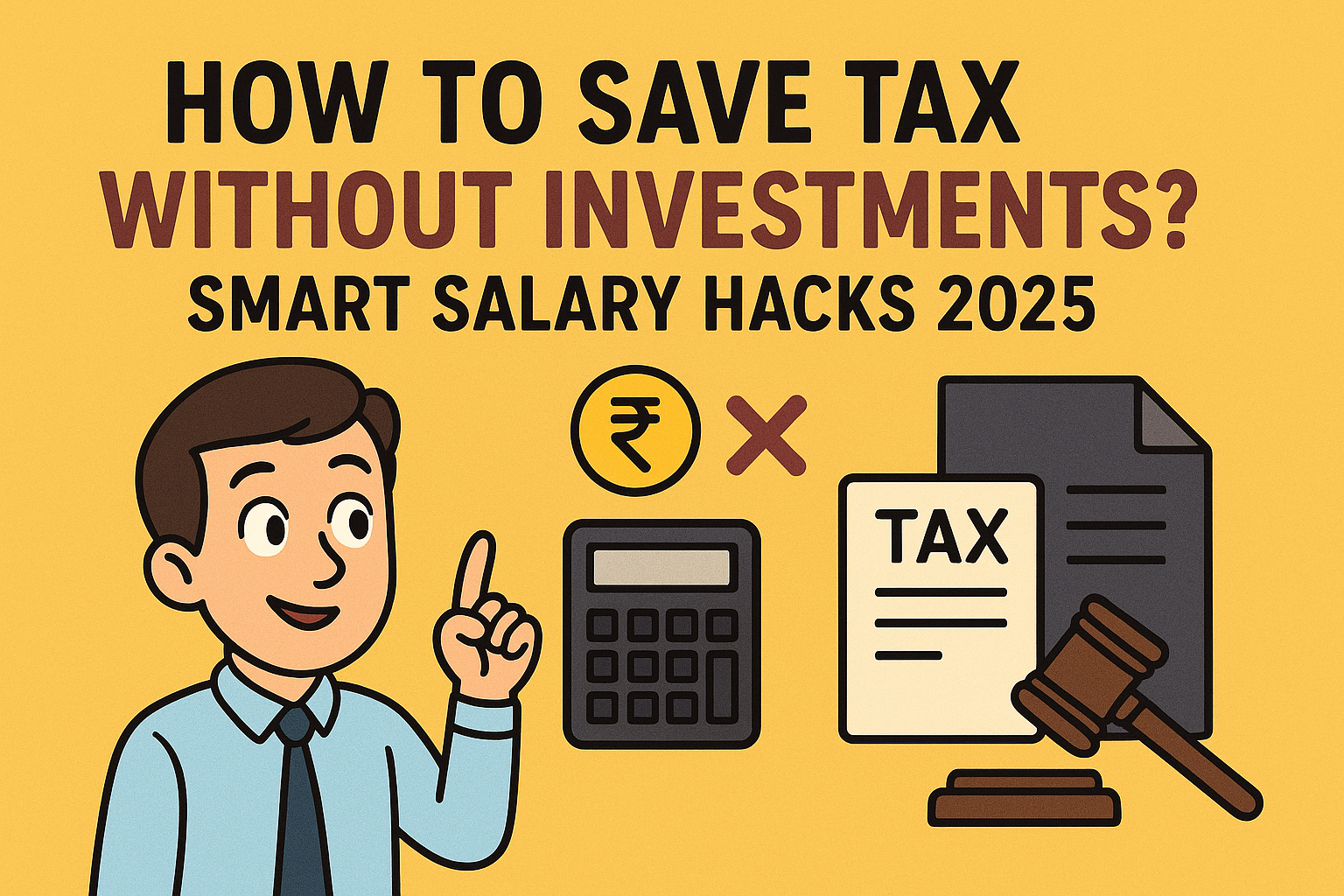Whenever we think about tax saving, the first thought that comes to mind is investment – LIC, PPF, ELSS, FD, NPS etc. But what if you don’t want to lock your money in long-term investments?
The good news is – you can still Save tax without investments a single rupee. Yes, by using the benefits already available in your salary structure and Income Tax rules, you can reduce your taxable income.
Let’s understand step by step how to save tax without investments in 2025.
Table of Contents
1. Standard Deduction – ₹50,000 for Everyone
This is the simplest and most powerful tax benefit for salaried people. Every employee automatically gets a ₹50,000 standard deduction from salary income.
- No proof required.
- No bills required.
- Everyone gets it.
Example: If your salary is ₹8,00,000 per year, after applying standard deduction, taxable salary becomes ₹7,50,000.
This single benefit reduces tax liability for all salaried individuals.
2. House Rent Allowance (HRA)
If you live in a rented house and your salary includes HRA, you can claim exemption under section 10(13A).
Exemption is calculated as the least of these three:
- Actual HRA received.
- 40% of basic salary (50% for metro cities).
- Rent paid – 10% of basic salary.
Example:
- Basic Salary = ₹40,000/month
- HRA = ₹15,000/month
- Rent Paid = ₹12,000/month in Delhi
Exempt HRA = ₹96,000 (as per calculation).
So, you save tax on this amount without any investment.
3. Leave Travel Allowance (LTA)
Many employers provide LTA in the salary. You can claim exemption on travel cost (air, train, bus) when you travel with your family within India.
- Only travel tickets covered (hotel, food not allowed).
- Allowed for 2 journeys in a block of 4 years (2022–2025 is current block).
Example: If you spend ₹20,000 on train/air tickets while travelling with family, you can claim that much as LTA exemption if provided in salary.
4. Reimbursement of Expenses
Some employers provide allowances for mobile bills, internet, conveyance, uniform, fuel, food coupons, etc. These can be claimed as tax-free reimbursements if supported with bills.
- Mobile/Internet bills – Tax free if claimed for office use.
- Food coupons (like Sodexo) – Exempt up to ₹50 per meal.
- Fuel reimbursement – Allowed if part of salary structure.
This is a smart way to reduce taxable salary without investments.
5. Home Loan Benefits (Without New Investment)
If you already have a home loan, you can save tax under:
- Section 24(b): Deduction up to ₹2,00,000 on home loan interest.
- Section 80C: Principal repayment qualifies too (though this comes under investment).
Since you are already paying EMIs, this is not a new investment but a benefit on existing liability.
6. Medical & Health Benefits
- Health Insurance from Employer: Premium paid by company is tax-free for employee.
- Medical Reimbursement (if available): Some companies reimburse OPD or hospital bills.
- Preventive Health Checkup: Deduction available up to ₹5,000 under section 80D (though it’s a small benefit).
Again, no fresh investment required if you already have medical bills or employer coverage.
7. Choosing the Right Tax Regime
From FY 2023–24 onwards, the new tax regime is default. It gives lower tax rates but fewer deductions. The old regime gives more exemptions like HRA, LTA, 80C etc.
If you don’t want to invest in 80C instruments but still get benefits like HRA, standard deduction, and LTA, then choosing the old regime may save you more tax.
It depends on your salary structure – so always compare before filing ITR.
8. Smart Ways To Save Tax Without Investments
- Education Loan Interest (Section 80E): If you are already repaying, deduction available for 8 years.
- NPS by Employer (Section 80CCD(2)): Contribution made by employer (up to 10% of basic salary) is tax-free. No personal investment needed.
- Gratuity, Leave Encashment, Retirement Benefits: These are partially or fully exempt under Income Tax.
Conclusion
You don’t always need to invest in PPF, ELSS, or Insurance to save tax. By understanding your salary slip and using benefits like Standard Deduction, HRA, LTA, Reimbursements, and Employer Contributions, you can save thousands every year without locking money in investments.
Smart tax planning means using existing allowances first, and then only going for extra investments if needed. So, check your salary structure carefully, and choose the best tax regime.
With the right strategy, you can easily save tax without investments in 2025. Contact taxgiveindia.com for tax related services.
